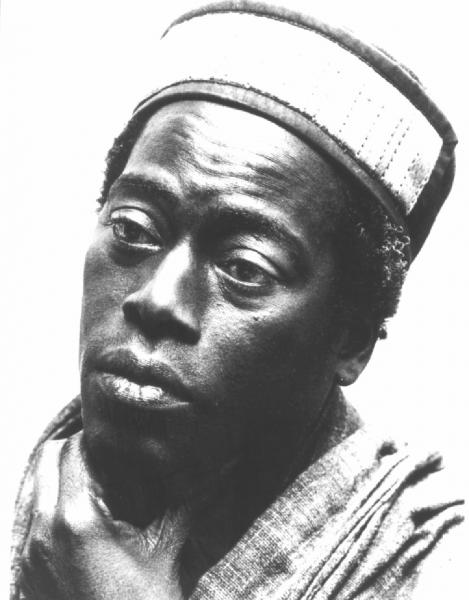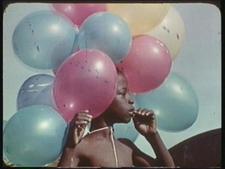
Djibril Diop Mambety died at only 53 years old, having made only seven films. But these films, such as Touki Bouki and Hyenas, helped put African cinema on the map. Their formal inventiveness and outspoken social critique challenged every notion of what cinema, African or otherwise, can and should be. He succumbed to cancer while editing The Little Girl Who Sold the Sun, the second of a planned trilogy about Africa’s “little people,” whom he called “the only true, consistent, unaffected people in the world, for whom every morning brings the same question: how to preserve what is essential to themselves.” The film was eventually finished, and heralded by New York Times critic A.O. Scott as “a masterpiece of understated humanity.” We are left to wonder what more Mambety could have achieved if he had continued to live and make films.
In his final interview, recorded with N. Frank Ukadike for Transition 78, Mambety shows no sign of his ailing condition, and comes across as an energetic and deep thinker, concerned with film’s fundamental purpose in the world. The interview can be found in full at California Newsreel. What follows are highlights demonstrating Mambety’s unique way of thinking.

“When children ask me, “How does one make a film?” I always say that you have to have freedom to make a film, and to have freedom, you need confidence. I tell them to close their eyes, to look at the stars, and look into their hearts, and then to open their eyes and see if the film they want to make is there, in front of their eyes.”

“The professional actor does not exist. Economically, yes, but basically, no. Professional actors break the magic of the dream and the magic of cinema. I say that as a creator and manipulator of character and event. I do not want to use an actor again once we have worked together. Once we have worked together, it seems to me that the actor has already given everything, because I have already asked everything of him or her. So we leave each other in the fullness of our first meeting. When I was young, when I went to the movies, I was always angry when I saw an actor who had died in one film appearing in another film alive. That broke the magic of cinema for me. It is very important to preserve the magic of cinema.”

“I do not refuse the word didactic. I follow the same principle as a story. When a story ends–or “falls into the ocean,” as we say–it creates dreams. It has energy and direction. I hope that all my stories finish by presenting a lesson for society, but there is also great freedom in my way of seeing and treating things. I do the audience justice: they have the freedom to enter or not to enter into my stories. They are free to take their own path, to enter or to leave. In one word, “liberty” is what characterizes what I am doing.

“One has to choose between engaging in stylistic research or the mere recording of facts. I feel that a filmmaker must go beyond the recording of facts. Moreover, I believe that Africans, in particular, must reinvent cinema. It will be a difficult task because our viewing audience is used to a specific film language, but a choice has to be made: either one is very popular and one talks to people in a simple and plain manner, or else one searches for an African film language that would exclude chattering and focus more on how to make use of visuals and sounds.”

“Anticolonialist laughter is ultimately laughter at oneself.”

“The motivation is always the picture, and for me it is always pictures from the place where you were born, the place you come from. I never dream about some other world, away from home. What I have always wanted to explore is my relationship with images, with the cinema; I want to see it, make an image of it, from the perspective of eternity.”




